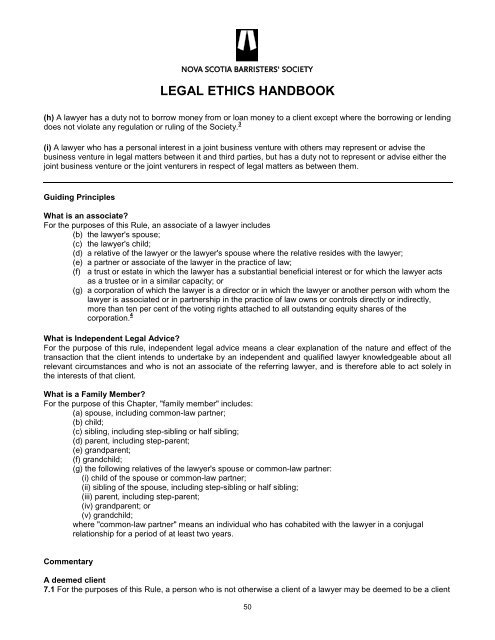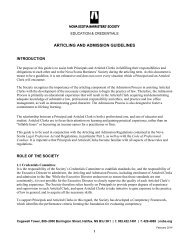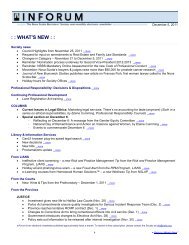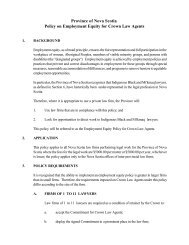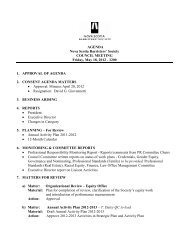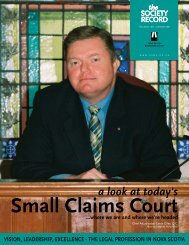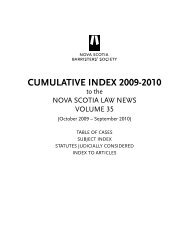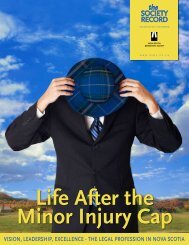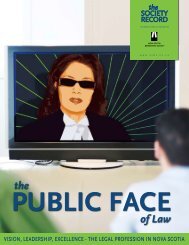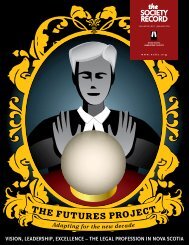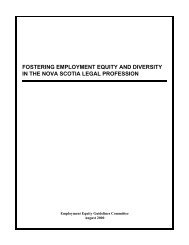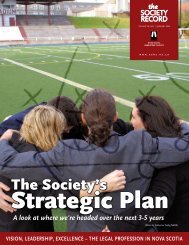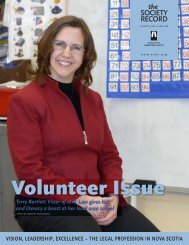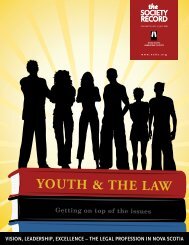legal ethics handbook - Nova Scotia Barristers' Society
legal ethics handbook - Nova Scotia Barristers' Society
legal ethics handbook - Nova Scotia Barristers' Society
Create successful ePaper yourself
Turn your PDF publications into a flip-book with our unique Google optimized e-Paper software.
LEGAL ETHICS HANDBOOK<br />
(h) A lawyer has a duty not to borrow money from or loan money to a client except where the borrowing or lending<br />
does not violate any regulation or ruling of the <strong>Society</strong>. 3<br />
(i) A lawyer who has a personal interest in a joint business venture with others may represent or advise the<br />
business venture in <strong>legal</strong> matters between it and third parties, but has a duty not to represent or advise either the<br />
joint business venture or the joint venturers in respect of <strong>legal</strong> matters as between them.<br />
Guiding Principles<br />
What is an associate?<br />
For the purposes of this Rule, an associate of a lawyer includes<br />
(b) the lawyer's spouse;<br />
(c) the lawyer's child;<br />
(d) a relative of the lawyer or the lawyer's spouse where the relative resides with the lawyer;<br />
(e) a partner or associate of the lawyer in the practice of law;<br />
(f) a trust or estate in which the lawyer has a substantial beneficial interest or for which the lawyer acts<br />
as a trustee or in a similar capacity; or<br />
(g) a corporation of which the lawyer is a director or in which the lawyer or another person with whom the<br />
lawyer is associated or in partnership in the practice of law owns or controls directly or indirectly,<br />
more than ten per cent of the voting rights attached to all outstanding equity shares of the<br />
corporation. 4<br />
What is Independent Legal Advice?<br />
For the purpose of this rule, independent <strong>legal</strong> advice means a clear explanation of the nature and effect of the<br />
transaction that the client intends to undertake by an independent and qualified lawyer knowledgeable about all<br />
relevant circumstances and who is not an associate of the referring lawyer, and is therefore able to act solely in<br />
the interests of that client.<br />
What is a Family Member?<br />
For the purpose of this Chapter, "family member" includes:<br />
(a) spouse, including common-law partner;<br />
(b) child;<br />
(c) sibling, including step-sibling or half sibling;<br />
(d) parent, including step-parent;<br />
(e) grandparent;<br />
(f) grandchild;<br />
(g) the following relatives of the lawyer's spouse or common-law partner:<br />
(i) child of the spouse or common-law partner;<br />
(ii) sibling of the spouse, including step-sibling or half sibling;<br />
(iii) parent, including step-parent;<br />
(iv) grandparent; or<br />
(v) grandchild;<br />
where "common-law partner" means an individual who has cohabited with the lawyer in a conjugal<br />
relationship for a period of at least two years.<br />
Commentary<br />
A deemed client<br />
7.1 For the purposes of this Rule, a person who is not otherwise a client of a lawyer may be deemed to be a client<br />
50


